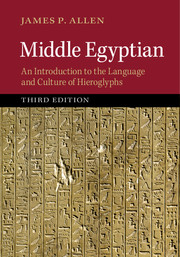Book contents
- Frontmatter
- Contents
- List of Figures
- Preface
- Lesson 1 Language and Writing
- Lesson 2 Unliteral Signs
- Lesson 3 Multiliteral Signs
- Lesson 4 Nouns
- Lesson 5 Pronouns
- Lesson 6 Adjectives
- Lesson 7 Adjectival and Nominal Sentences
- Lesson 8 Prepositions and Adverbs
- Lesson 9 Numbers
- Lesson 10 Adverbial Sentences
- Lesson 11 Non-verbal Sentences
- Lesson 12 Verbs
- Lesson 13 The Infinitival Forms
- Lesson 14 The Pseudo-verbal Construction
- Lesson 15 The Imperative and Particles
- Lesson 16 The Stative
- Lesson 17 The sdm.n.f
- Lesson 18 The sdm.f
- Lesson 19 The Other Forms of the Suffix Conjugation
- Lesson 20 Adverb Clauses
- Lesson 21 Noun Clauses
- Lesson 22 Relative Clauses
- Lesson 23 The Active Participle
- Lesson 24 The Passive Participle
- Lesson 25 Emphatic Sentences
- Lesson 26 Middle Egyptian Grammar
- Sign List
- Dictionary
- Text References
- Answers to the Exercises
- Index
Lesson 17 - The sdm.n.f
Published online by Cambridge University Press: 05 July 2014
- Frontmatter
- Contents
- List of Figures
- Preface
- Lesson 1 Language and Writing
- Lesson 2 Unliteral Signs
- Lesson 3 Multiliteral Signs
- Lesson 4 Nouns
- Lesson 5 Pronouns
- Lesson 6 Adjectives
- Lesson 7 Adjectival and Nominal Sentences
- Lesson 8 Prepositions and Adverbs
- Lesson 9 Numbers
- Lesson 10 Adverbial Sentences
- Lesson 11 Non-verbal Sentences
- Lesson 12 Verbs
- Lesson 13 The Infinitival Forms
- Lesson 14 The Pseudo-verbal Construction
- Lesson 15 The Imperative and Particles
- Lesson 16 The Stative
- Lesson 17 The sdm.n.f
- Lesson 18 The sdm.f
- Lesson 19 The Other Forms of the Suffix Conjugation
- Lesson 20 Adverb Clauses
- Lesson 21 Noun Clauses
- Lesson 22 Relative Clauses
- Lesson 23 The Active Participle
- Lesson 24 The Passive Participle
- Lesson 25 Emphatic Sentences
- Lesson 26 Middle Egyptian Grammar
- Sign List
- Dictionary
- Text References
- Answers to the Exercises
- Index
Summary
17.1 Definition
The English perfect is a verb form used to express completed action. Most such actions are past from the point of view of the speaker: an example is the sentence Jill has done her homework, where the verb form has done indicates that the action of Jill doing her homework is completed. But an action can be described as completed even if it did not happen in the past: for example, in the English sentence Jack can watch television after he has done his homework, the verb form has done describes the action of Jack doing his homework as completed with respect to the action of the main clause, even though it has yet to happen from the speaker's point of view.
The perfect does not necessarily have to refer to a past event because it primarily expresses an aspect rather than a tense (§ 12.9.2). As such, it is different from the past tense, which always describes past action: for example, the sentence Jack did his homework can only refer to a past event, not one that has yet to happen.
- Type
- Chapter
- Information
- Middle EgyptianAn Introduction to the Language and Culture of Hieroglyphs, pp. 245 - 264Publisher: Cambridge University PressPrint publication year: 2014



